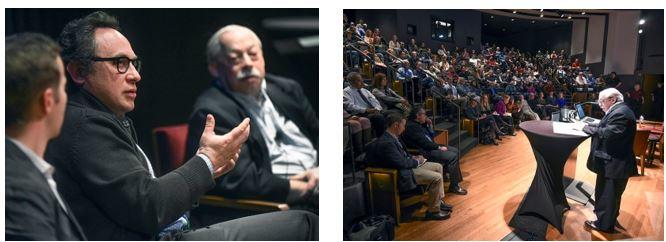
Wednesday, February 17, 2016 - 11:30am to 1:00pm
Best Buy Theater, 4th floor, Northrop Auditorium
Humans, like all creatures on Earth, exist in symbiotic relationships with specialized microbial communities that inhabit our bodies. In this sense, we are super-organisms and our microbes affect many aspects of our physiology. Yet, the modern lifestyle, including widespread use of antibiotics and altered diet, has not been kind to our microbial partners, causing a loss of microbial diversity in our bodies accompanied by the rise of antibiotic-resistant rogue superbugs. Dr. Khoruts described his work to develop new therapeutic interventions to repair the invisible and unfolding ecological crisis within.
Co-sponsored by the University of Minnesota’s BioTechnology Institute and the Microbiota Therapeutics Program
Commentator:
Prof. Dan Knights, PhD
The BioTechnology Institute and Department of Computer Science and Engineering
University of Minnesota
Attorneys
1.5 standard CLE credits are approved. Event ID: 215666.
American Medical Association/PRA
The University of Minnesota is accredited by the Accreditation Council for Continuing Medical Education (ACCME) to provide continuing medical education for physicians.
Physicians
The University of Minnesota designates this live educational activity for a maximum of 1.5 AMA PRA Category 1 Credits™. Physicians should claim only the credit commensurate with the extent of their participation in the activity.
Other Health Care Professionals: Research coordinators, nurse practitioners, nurses, and other health care professionals who participate in this CE activity may submit their Statements of Participation to their appropriate accrediting organizations or state boards for consideration of credit. The participant is responsible for determining whether this activity meets the requirements for acceptable continuing education.

Alexander Khoruts, MD, is the Medical Director of the University of Minnesota Microbiota Therapeutics Program, which brings together investigators from different disciplines to develop treatments for antibiotic-resistant infections such as C. difficile, gut inflammation, diabetes, and gastrointestinal cancer. This team has led the scientific development of fecal microbiota transplants and their introduction into mainstream medicine; their work has been profiled in major national media outlets, including the New York Times, Scientific American, National Public Radio, and many others. Dr. Khoruts is a gastroenterologist who also trained in basic immunology as a Howard Hughes Physician Fellow under the mentorship of Dr. Marc Jenkins in the Department of Microbiology at the University of Minnesota, and focused his early research career on questions of immunologic tolerance and mucosal inflammation.